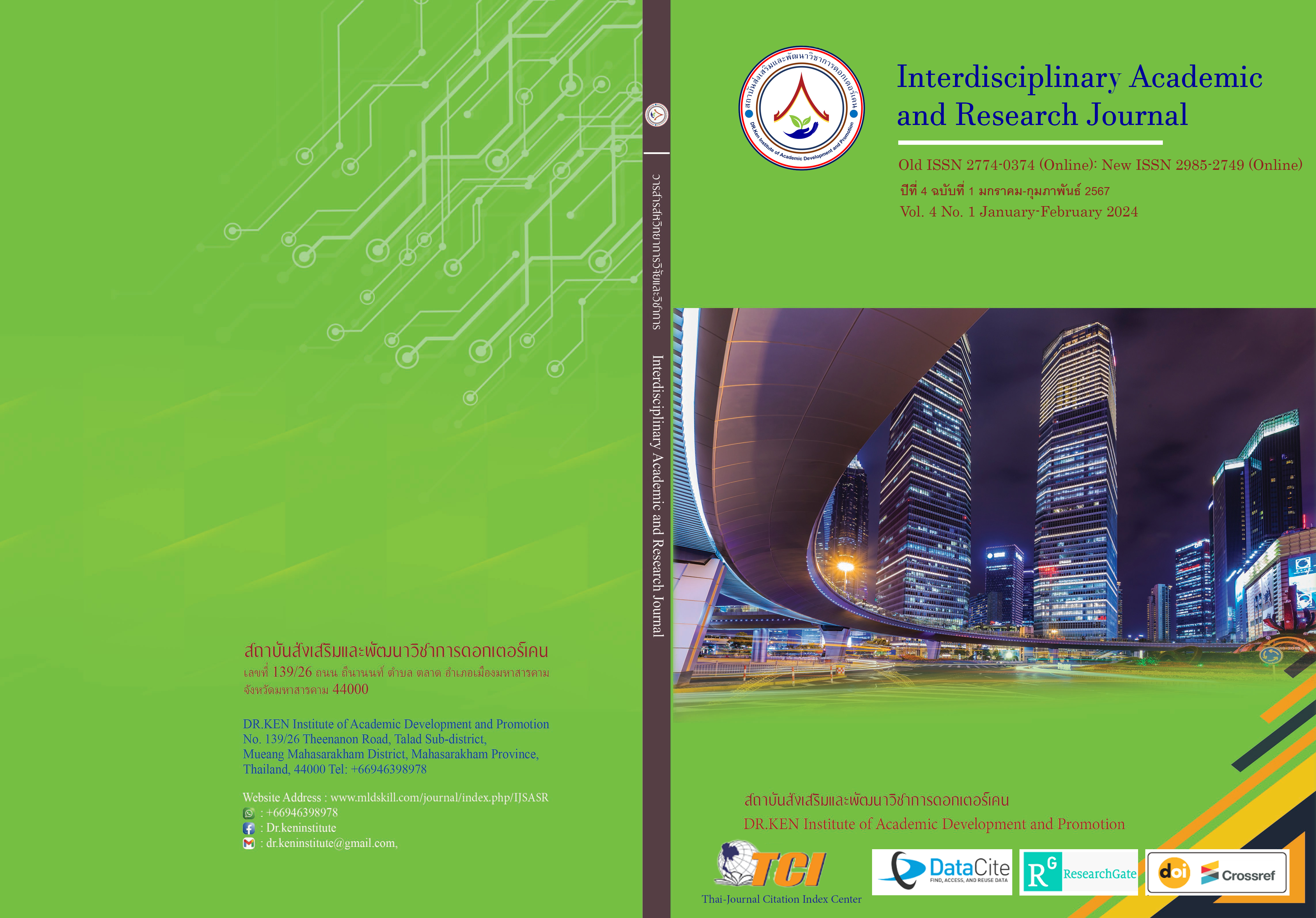Leadership in The Digital Age of School Administrator under the Nakhonratchasima Secondary Education Service Area Office
DOI:
https://doi.org/10.60027/iarj.2024.273286Keywords:
Leadership Status; , Digital Leadership; , Educational AdministratorsAbstract
Background and Aimes: Digital leadership is the skill that leaders in the digital age must possess to effectively lead organizations, utilizing new technologies to manage operations and steer the organization towards successful and efficient outcomes. The objectives of this study are: 1) to study the digital leadership status of educational administrators affiliated with the Secondary schools' educational office in Nakhon Ratchasima province, and 2) to compare the digital leadership status of educational administrators affiliated with the Secondary school's educational office in Nakhon Ratchasima province based on educational level and school size. It is quantitative research.
Methodology: The population used in the research was 2,763 teachers of schools under the Nakhon Ratchasima Secondary Education Area Office in the academic year 2023 and 337 samples using the preliminary sampling method. The research tools used included questionnaires and statistical methods for data analysis, such as frequency, mean, percentage, standard deviation, F-test, and t-test.
Results: 1) the overall digital leadership status of educational administrators is at a high level, and 2) there is a statistically significant difference in the opinions regarding the digital leadership status of educational administrators based on educational level and school size at the .05 significance level.
Conclusion: the research reveals a high overall level of digital-era leadership among educational administrators. Furthermore, the analysis comparing perceptions of digital-era leadership based on education levels shows no significant differences, but statistically significant distinctions emerge when considering the size of educational institutions at the .05 significance level.
References
กระทรวงศึกษาธิการ. (2542). พระราชบัญญัติการศึกษาแห่งชาติ พุทธศักราช 2542. กรุงเทพฯ : บริษัทสยามสปอรต์ ซินดิเคท จำกัด.
คมสัณห์ จันสอน และอุไรสุทธิแย้ม. (2566). ภาวะผู้นำดิจิทัลของผู้บริหารสถานศึกษา สังกัดสำนักงานเขตพื้นที่การศึกษามัธยมศึกษากรุงเทพมหานคร เขต 2. วารสารคณะครุศาสตร์ มหาวิทยาลัยราชภัฏนครสวรรค์. 6 (2), 226 – 228.
จารุนันท์ ผิวผาง, ทัศนา ประสานตรี,และสุมาลี ศรีพุทธรินทร์. (2564). ภาวะผู้นํายุคดิจิทัลที่ส่งผลต่อการใช้ เทคโนโลยีสารสนเทศและการสื่อสารในการบริหารจัดการของผู้บริหารสถานศึกษา สังกัดสํานักงานเขตพื้นที่การศึกษาประถมศึกษานครพนม เขต 2. วารสารรัชต์ภาคย์. 15 (39), 96–108.
จิณณวัตร ปะโคทัง. (2561). ภาวะผู้นำยุคดิจิทัล สำหรับผู้บริหารโรงเรียนมืออาชีพ. อุบลราชธานี : ศิริธรรมออฟเซ็ท.
จุฑามาศ กมล, และสุภาวดี ลาภเจริญ (2565). ภาวะผู้นําดิจิทัลของผู้บริหารสถานศึกษาโรงเรียนในสังกัดสหวิทยาเขตปิยมิตรสํานักงานเขตพื้นที่การศึกษามัธยมศึกษาปทุมธานี. Journal of Roi Kaensarn Academ. 7 (8),388-403.
เจษฎา ชวนะไพศาล. (2563). แนวทางการพัฒนาภาวะผู้นำเชิงเทคโนโลยีของผู้บริหารสถานศึกษากลุ่ม สหวิทยาเขตทวารวดี สังกัดสำนักงานเขตพื้นที่การศึกษามัธยมศึกษาสุพรรณบุรี. วิทยานิพนธ์ศึกษาศาสตรมหาบัณฑิต สาขาวิชาการบริหารการศึกษา. บัณฑิตวิทยาลัย: มหาวิทยาลัยศิลปากร.
ทศพล สุวรรณราช และชลาภรณ์ สุวรรณสัมฤทธิ์. (2564). ภาวะผู้นำดิจิทัลของผู้บริหารสถานศึกษา สังกัดสำนักงานเขตพื้นที่การศึกษามัธยมศึกษานนทบุรี. วารสารมนุษยศาสตร์และสังคมศาสตร์ มหาวิทยาลัยราชพฤกษ์. 7 (3), 160 –177.
บุญชม ศรีสะอาด. (2553). การวิจัยเบื้องต้น. กรุงเทพฯ : สุวีริยาสาส์น.
ปิยะ ทองมา. (2564). ภาวะผู้นำแบบเหนือชั้นของผู้บริหารสถานศึกษาโรงเรียนมาตรฐานสากลระดับมัธยมศึกษา สังกัดสำนักงานศึกษาธิการภาค 2. การศึกษาอิสระศึกษาศาสตรมหาบัณฑิต (การบริหารการศึกษา). มหาวิทยาลัยรามคำแหง.
ไพชยนต์ อ่อนช้อย. (2563). คุณลักษณะผู้บริหารสถานศึกษาในยุคดิจิทัลตามความคิดเห็นของครู สังกัดสํานักงานเขตพื้นที่การศึกษาประถมศึกษาศรีสะเกษ เขต 1. วิทยานิพนธ์ปริญญาครุศาสตร์มหาบัณฑิต การบริหารการศึกษา : มหาวิทยาลัยราชภัฏศรีสะเกษ.
รุสมอ มะนอ. (2566). ภาวะผู้นำดิจิทัลของผู้บริหารสถานศึกษาตามความคิดเห็นของครูสังกัดสำนักงานเขตพื้นที่การศึกษามัธยมศึกษากรุงเทพมหานคร เขต 1. วารสารศิลปากรศึกษาศาสตร์วิจัย. 15 (1), 143 – 145.
เลอศักดิ์ ตามา และสุมาลี ศรีพุทธรินทร์. (2564). ภาวะผู้นำยุคดิจิทัลของผู้บริหารสถานศึกษาที่ส่งผลต่อการดำเนินงานระบบประกันคุณภาพการศึกษาของสถานศึกษาสังกัดสำนักงานเขตพื้นที่การศึกษามัธยมศึกษา เขต 22. วารสารรัชต์ภาคย์. 15 (38), 224 – 240.
วีรวัฒน์ การุณวงษ์. (2564). ความสัมพันธ์ระหว่างภาวะผู้นำทางเทคโนโลยีของผู้บริหารสถานศึกษากับการดำเนินงานระบบการดูแลช่วยเหลือนักเรียนสังกัดสำนักงานเขตพื้นที่การศึกษาประถมศึกษาปทุมธานี. วิทยานิพนธ์ปริญญาศึกษาศาสตรมหาบัณฑิต การบริหารการศึกษา : มหาวิทยาลัยเทคโนโลยีราชมงคลธัญบุรี.
สุกัญญา แช่มช้อย. (2560). การบริหารสถานศึกษาในยุคดิจิทัล. พิษณุโลก : มหาวิทยาลัยนเรศวร.
สุกัญญา แช่มช้อย. (2561). ภาวะผู้นำทางเทคโนโลยี : การนำเทคโนโลยีสู่ห้องเรียนและโรงเรียนในศตวรรษที่ 21. วารสารศึกษาศาสตร์มหาวิทยาลัยนเรศวร. 16 (4), 216-224.
สุกัญญา แช่มช้อย. (2562). การบริหารสถานศึกษาในยุคดิจิทัล. พิมพ์ครั้งที่ 2. กรุงเทพฯ : สํานักพิมพ์จุฬาลงกรณ์มหาวิทยาลัย.
สุชญา โกมลวานิช. (2563). ภาวะผู้นำดิจิทัลของผู้บริหารสถานศึกษาที่ส่งผลต่อสมรรถนะครูในศตวรรษที่ 21 สังกัดสำนักงานเขตพื้นที่การศึกษามัธยมศึกษา เขต 23. วิทยานิพนธ์ปริญญาศึกษาศาสตรมหาบัณฑิต การบริหารและพัฒนาคุณภาพการศึกษา : มหาวิทยาลัยขอนแก่น.
เอกชัย กี่สุขพันธ์. (2562). การบริหารสถานศึกษายุคดิจิทัล (School Management in Digital Era). Retrieved On 16 November 2023 from http://www.pracharathschool.go.th/skill/detail 52232
Bauchu, T, & Bauchu, T. (2019). The Status of Digital Leadership of Education Management Administrators. Journal of Educational Studies, 13 (2), 285-294.
Hamzah, N.H., Nasir, M.K.M., & Wahab, J.A. (2021).The effects of principals’ digital leadership on teachers’ digital teaching during the COVID-19 pandemic in Malaysia. Journal of Education and e-Learning Research, 8 (2), 216–221.
HERX.asia (2019). How to be a good leader in the Digital Age. Retrieved On 16 November 2023 https://th.hrnote.asia/personnel-management/190826-good-leader- digital-age/
Krejcie, R.V. & Morgan, D.W. (1970). Determining Sample Size for Research Activities. Educational and Psychological Measurement, 30 (3), 607-610.
Mihardjo, L.W.W., & Rukmana, R.A.N. (2018). Does digital leadership impact directly or indirectly on dynamic capability: Case on Indonesia telecommunication industry in digital transformation?. The Journal of Social Sciences Research [Special issue], 2, 832–841. DOI:10.32861/jssr.spi2.832.841
Sanrattana, W., & et al. (2018). Leadership for The 21st Century. Journal of Education Naresuan University, 20(1), 261–271. Retrieved from https://so06.tci-thaijo.org/index.php/edujournal_nu/article/view/115599
Sultan, Y.H., & Suhail, K.S. (2019). The impact of significant factors of digital leadership on gamification marketing strategy. International Journal of Advance Research and Development, 4 (5), 29-33.
Sungsahachat, S. (2017). Factors Analysis of Leadership for 21st Century of School Administrators Primary Educational Service Area Office 1 Phitsanulok. Master of Education (Educational Administration). Chiang Mai University.
Wasono, L.W., & Furinto, A. (2018). The effect of digital leadership and innovation management for incumbent telecommunication companies in the digital disruptive era. International Journal of Engineering & Technology, 7 (2.29), 125 –130. DOI:10.14419/ijet.v7i2.29.13142
Zhong, L. (2017). Indicators of digital leadership in the context of K-12 education. Journal of Educational Technology Development and Exchange (JETDE), 10 (1), 27–40.
Downloads
Published
How to Cite
Issue
Section
License
Copyright (c) 2024 Chamrat Mungfaoklang, Sangaroon Bunsri, Roseryn Ardthaisong

This work is licensed under a Creative Commons Attribution-NonCommercial-NoDerivatives 4.0 International License.
Copyright on any article in the Interdisciplinary Academic and Research Journal is retained by the author(s) under the under the Creative Commons Attribution-NonCommercial-NoDerivatives 4.0 International License. Permission to use text, content, images, etc. of publication. Any user to read, download, copy, distribute, print, search, or link to the full texts of articles, crawl them for indexing, pass them as data to software, or use them for any other lawful purpose. But do not use it for commercial use or with the intent to benefit any business.
















.png)


